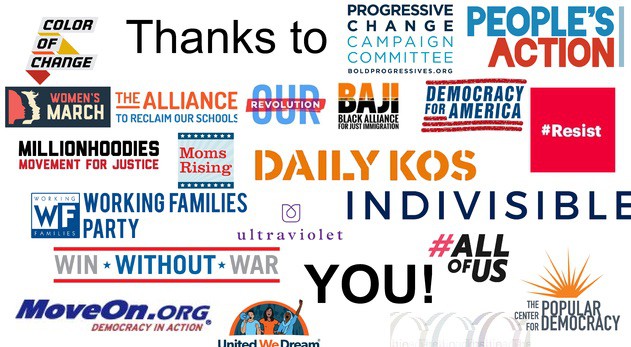The widespread outrage sparked by white supremacist violence in Charlottesville may prompt dialogue and action nationwide to promote racial equity, according to leaders from the Virginia city.
“They wanted to think they could intimidate us, but it didn’t work - it actually backfired,” said Wes Bellamy, Charlottesville’s vice mayor. “We’re now stronger, we’re much more encouraged. We’re rallying, even moreso together."

Sponsors of August 20, 2017 Ready to Resist organizing call
“We have to be smarter, and use policy to our advantage,” Bellamy added, highlighting Charlottesville’s $4 million plan to create equity for African-American residents through the redevelopment of public housing and parks, free GED training and the creation of an African-American Heritage Center.
“White supremacists are not going to be kind in the way in which they come and attack all peoples – not just Black people or just Jewish people or whomever, they want to attack everyone,” Bellamy said. “We’re in a situation where we’ve got to go hard, or go home.”
Bellamy spoke to 32,000 registered participants on a nationwide conference call sponsored by twenty progressive organizations, including MoveOn.org, People’s Action, the Center for Popular Democracy, Indivisible, the Women’s March and Color of Change.
The call was part of the “Ready to Resist” series of weekly organizing calls that have been hosted by this growing coalition of progressive groups since January.
Attendance on the calls has swelled, and they have played an active role in the growth of resistance to the Trump agenda, including the Muslim travel ban and the failed efforts to repeal health care.
“Sanity and decency have prevailed, partly because of leadership, courage and good organizing,” said Mehrdad Azemun, campaigns director for People’s Action. Azemun hailed the weekend’s peaceful mass protests in Boston, where 40,000 anti-hate activists outnumbered white nationalists by a factor of a hundred to one.
Arisha Hatch from Color of Change reinforced this idea, explaining that the swift dissolution of Trump’s business advisory councils in the wake of Charlottesville was, in fact, the culmination of months of pressure on corporate leaders by her group and others.
“Our work here is the difficult work of standing against white supremacy in every single one of its forms,” said Azemun. “By opposing hate groups, by taking down racist monuments, by opposing hate speech, and by rooting out and reversing laws that are based on ideas of white supremacy.”
Speakers on the call included U.S. Representative Bonnie Watson-Coleman from New Jersey’s 12th District, Keron Blair of the Alliance to Reclaim Our Schools and Greisa Martinez of United We Dream.
Eric Ward, a senior fellow at the Southern Poverty Law Center, expained the rise of white nationalism in the United States, which he said morphed out of resistance to the successes of the Civil Rights movement into its current form, which seeks to promote divisions within society in order to seize state power.
““Bigotry and prejudice are not the goal,” said Ward. “This is a social movement that seeks to use prejudice and bigotry to seize the state.”
Ward urged activists to be bold and creative, not only in street protests but also in initiating dialogue with neighbors who may hold differing views.
“We need to break the paralysis and build solidarity,” Ward said. ”If we are unable to work up the courage to talk to our neighbors and friends, how will we ever build the courage to confront a social movement that seeks to undercut the idea of a people-centered democracy?”
To promote dialogue in local communities, the Women’s March is sponsoring a week of community potlucks all across the country. Watson-Coleman asked activists to urge their representatives in Congress to back a measure to censure President Trump for failing to speak out forcefully against violent white supremacists.
“It’s not enough to tweet,” said Watson-Coleman. “This censure offers a modest opportunity to speak up and go on the record.”
Hatch drew attention to Color of Change’s campaigns to urge Visa, MasterCard and other payment systems to refuse to facilitate online payments for hate groups. Blair reminded callers that the Trump administration still plans deep cuts to education, which will disproportionately affect low-income families and communities of color.
“These cuts are not just bad, they’re racist,” Blair said.
Despite these challenges, activists found cause for optimism in the outpouring of solidarity and dialogue that Charlottesville has spurred across the country.
“I’m humbled by everyone’s commitment to create a society where everyone can live, love and work,” Ward said.

